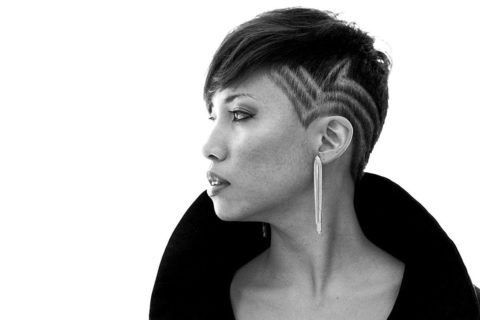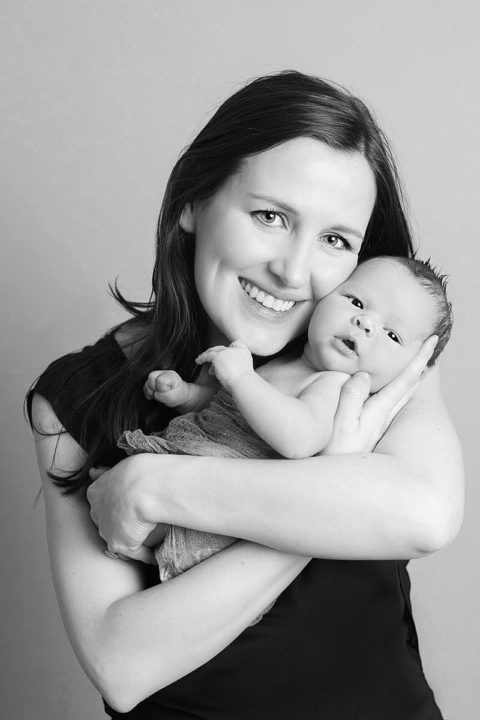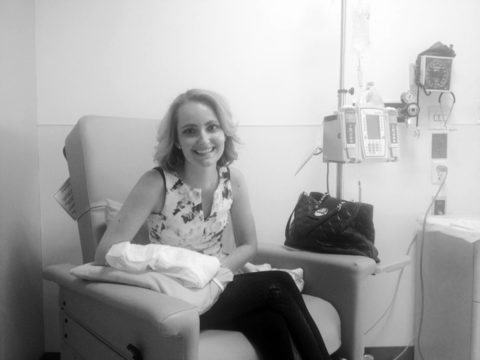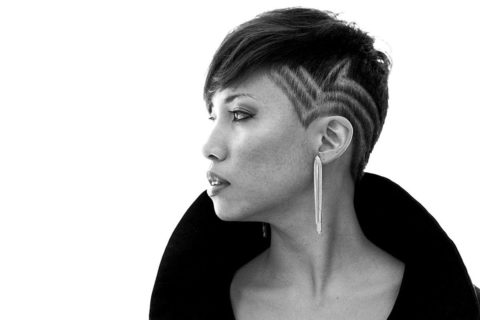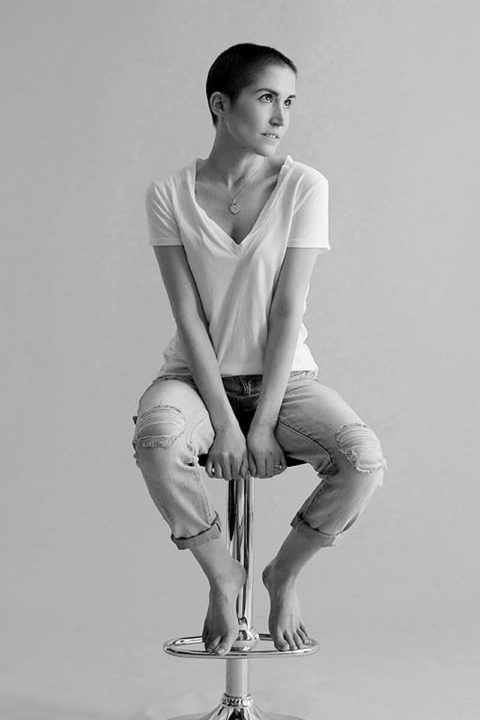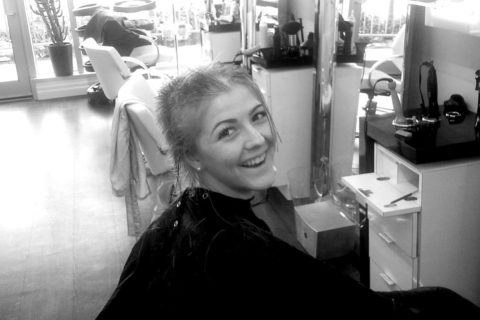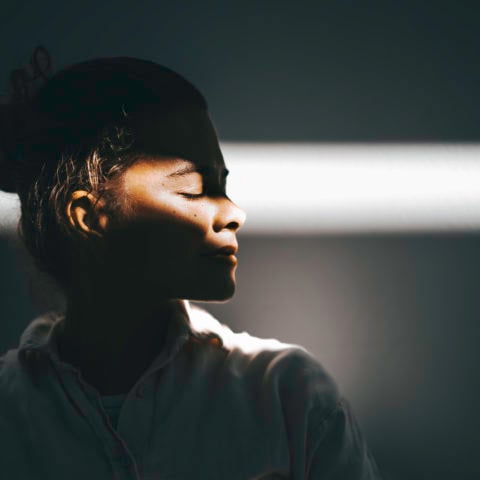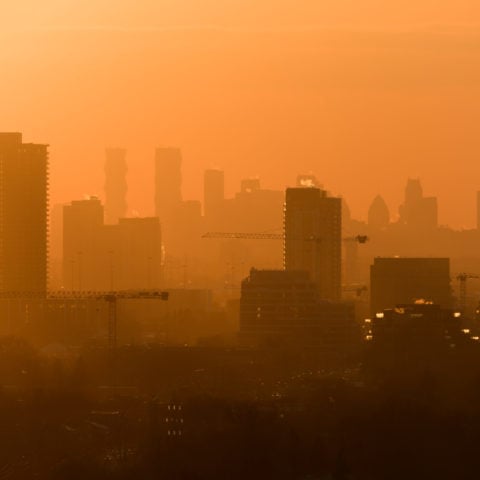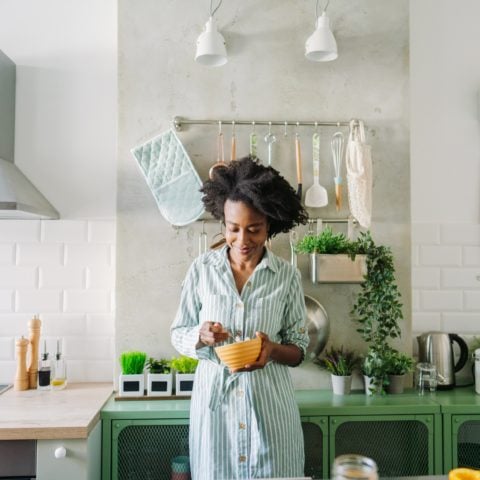5 incredible women share their experiences of being diagnosed with breast cancer in their 20s
While you might be inclined to relegate the topic of cancer to the “things to worry about when you get older” category, these young women’s stories will change your mind.
Diagnosed with breast cancer before they were 30, they struggled to come to terms with the reality of treatment, and also the life lessons that come with it—all while most people are just figuring out how to recover from hangovers and planning weddings. Part of Rethink Breast Cancer’s Rethink Young Women’s Network—a community of young women with breast cancer who support one another and help advocate for change—they teach us the value of optimism, camaraderie, self-empowerment, education and kindness.
Joanna
Tell us a bit about yourself.
“I’m a 32-year-old breast cancer survivor living in Vancouver. I am a director of human resources in the hospitality sector, currently on maternity leave with my six-month-old baby, Declan.”
At what age were you diagnosed, and how did it feel to be a young person with breast cancer?
“I found out I had breast cancer when I was 26 years old. I discovered a lump early, but it took over six months before I was diagnosed. It was difficult to find a doctor who would perform a biopsy or send me for a mammogram because of my age. I felt very isolated and embarrassed after my diagnosis. My friends were sharing news of their engagements, pregnancies or promotions; I was sharing news of my chemotherapy, radiation and surgery dates.”
What was the hardest part of your treatment?
“The hardest part for me was learning that I might not be able to have children. There is a risk that chemotherapy can cause reproductive challenges. I was really fortunate to have an outstanding oncologist who supported my plans to be a mom. I now have a healthy, happy baby boy. I often worry about recurrence, but I am grateful that I’ve been thriving for the last five years. I actually got to celebrate that five-year milestone a day after bringing Declan home from the hospital.”
What was the most unexpected thing you learned from your experience?
“I was the one in the fight but watching my parents, friends and partner endure emotional strain was very hard. I was lucky to be surrounded by an incredible amount of love and support. I could not have gotten through those dark days without my husband. He was always there to catch my tears, kiss my bald head and tell me I looked beautiful.”
What advice would you give to someone who is newly diagnosed?
“It’s important to seek support. I met some incredible young women with breast cancer who helped me stay positive. Rethink Breast Cancer is a fantastic organization that helps young women facing this disease. It’s also important to laugh. They say laughter is the best medicine, so find the strongest possible dose of it.”
What made you feel good or “normal” while going through the treatments?
“Cancer stole so much from me but losing my hair and eyelashes was especially hard. I became an expert at applying M.A.C eyelashes every day—once I learned to avoid gluing my eyelids together. I wore a gorgeous long wig that I even had my hairdresser style with bangs. On my last day of treatment, I bought myself the tallest boots I could find to remind myself that I had just kicked some serious ass.”
Judit Saunders
Tell us a bit about yourself.
“I am 30 years old, married, living in Calgary, and I am a registered nurse. However, I had to go on disability after my most recent cancer diagnosis.”
At what age were you diagnosed, and how did it feel to be a young person with breast cancer?
“I was initially diagnosed when I was 26 years old. I felt a lump and, despite my background in healthcare, I never would have imagined it would turn into cancer. I can’t stress it enough: Know your bodies, and if you find a lump go to the doctor and be persistent. Don’t ever allow someone to downplay your fears and don’t ever tolerate the words, ‘You are too young.’ Cancer wasn’t a part of my plans, but who really plans to get cancer? I had finished university and had a dream career as a pediatric nurse, built a home and got married. Next would have been having children, but rather I got cancer. My dreams of having a family are over, and that was honestly the most devastating component to my diagnosis. Cancer can be very isolating when diagnosed at a young age. After all the gruelling treatments, I learned that my cancer had recurred just over two years later when I was 28. I now have stage IV, metastatic breast cancer. I don’t plan my life in years anymore. It’s day to day, scan to scan. There are no guarantees, and my life is planned around treatments and appointments. People my age can’t relate to my reality, and, truthfully, I wouldn’t expect them to.”
What was the hardest part of your treatment?
“The hardest component of treatment is the fact that it will never end. Stage IV is a completely different league in the breast cancer world. Chemotherapy is hard. You learn to manage the side effects so that you can balance toxic therapies with quality of life. You want to live so bad, but at the same time you wonder at what cost? It all comes down to learning to manage side effects and being grateful for each day.”
What was the most unexpected thing you learned from your experience?
“I never in a million years thought I would be strong enough, both physically and mentally, to endure cancer and its treatments. Yet I find myself surprised by how much I can handle. Secondly, it is the kindness of my dearest friends and family, and even strangers that I have never met that has truly left me in complete awe. It’s easy to see all the bad things in the world when you turn on the television, but this experience has truly taught me that there is an abundance of good.”
What advice would you give to someone who is newly diagnosed?
“Breathe. The moment you hear the words ‘You have breast cancer,’ you become numb and your mind immediately goes to wanting an immediate fix. I firmly believe in hearing all your options and doing your own research into different treatment options, etc. Sometimes our knee-jerk reaction to this diagnosis is immediately wanting a double mastectomy, despite having a breast that isn’t diseased. Many don’t realize that prophylactically removing your ‘good’ breast [might have] no bearing on long-term survival. Be your own advocate, ask lots of questions, become informed and try to find other young women who are also dealing with a similar diagnosis. Surround yourself with people who love and care about you. Having a support system is huge when dealing with cancer at a young age.”
What makes you feel good or “normal” while going through the treatments?
“The one thing that made me feel relatively ‘normal’ during treatments was getting dressed up and doing my makeup whenever I had any treatments, appointments or scans. I knew I could go in comfy clothes, but it made me feel better about myself to try and still look like my old self. I would always go to treatments with either a family member or my bestie, and we would make a dinner date out of these appointments afterwards. Oddly enough, I actually started looking forward to these days because they would turn into fun outings, and I was always guaranteed to laugh. I also learned to colour in my eyebrows after I finished chemotherapy with my first diagnosis, with The Look Good Feel Better workshop. It really is such a simple thing to do but has such a huge impact on the way you feel about yourself and your confidence.”
Kristal Wei
Tell us a bit about yourself.
“I am 33 years old. I’ve lived in Vancouver for the past two years, but originally grew up in Trinidad and then spent 12 years in Toronto for school and work. I went to university for accounting and worked in that field for a few years; however, after going through my breast cancer experience, I decided to pursue something I loved more. I moved to Vancouver and now run my own dance school with my partner; I couldn’t be happier!
At what age were you diagnosed, and how did it feel to be a young person with breast cancer?
“I was 28 when diagnosed with breast cancer. At any age it’s devastating news, but being so young it’s quite a shock. You think you’re invincible when you’re younger, but I was surprised to learn how many people do get diagnosed at a young age. At 28 I felt like I was just getting started with my life. I had a good job with one of the top accounting firms, was in a new relationship, had a very active social life and was part of a Latin dance team. All of a sudden everything had to be put on hold or was put into question.”
What was the hardest part of your treatment?
“I underwent surgery and then did six rounds of chemotherapy. Physically, the chemo treatments were definitely the most difficult time for me. Your hair falls out, your skin gets dry and pale, you get hot flashes like you’re menopausal and your energy is drained. You definitely don’t look or feel like yourself. Then, surprisingly, after the treatments are done it’s a very low time as well. You never go back to how things were before; you now have the rest of your life to worry about. Treatments are over, so now what? Is the cancer going to come back? Do I have to keep taking drugs to prevent a reoccurrence? It’s quite overwhelming to start your life all over again.”
What was the most unexpected thing you learned from your experience?
“I learned that so many people get caught up in life and society’s pressures and expectations that they forget to take care of themselves. This experience taught me to slow down and made me realize what’s more important in life. I used to feel I had to do everything, please everyone and always say yes, but while I was going through treatments I was finally able to put myself first and do things for me. It gave me the time to take a step back and look after myself for once. It definitely opened my eyes and changed my priorities.”
What advice would you give to someone who is newly diagnosed?
“Take it one day at a time, and it’s OK to not be positive all the time. I’m not saying be negative all the time—positivity helps. But let’s face it: Cancer sucks, and it’s not easy to deal with! Try to find an avenue to get your thoughts out and to talk about what you’re going through. For me, I went to support groups at the hospital and also found a group specifically for young women, Rethink Breast Cancer. Remember, you don’t have to deal with this alone.”
What makes you feel good or “normal” while going through the treatments?
“When I had surgery and chemo, it was easy to stay cooped up at home, but sometimes just getting out and getting some fresh air or light exercise made me feel so much better. I did some gentle yoga classes, went for walks or did a little dancing. To help me look more normal, and feel more comfortable, I had wigs or hats. I attended a great workshop at the hospital teaching how to use makeup to cover up the effects of chemo. I also went to get special bras and swimsuits for myself post-surgery—Melmira is a great store for this.”
Sarah Taylor-Haddad
Tell us a bit about yourself.
“I was born in Ottawa and moved to Montreal after high school to study fashion design. I’ve been married for two years now to my high school sweetheart and we have a beautiful black lab. I’m currently a clothing designer for Groupe Dynamite in Montreal.”
At what age were you diagnosed, and how did it feel to be a young person with breast cancer?
“At age 26, in June 2014, I received the news every woman fears: You have breast cancer. I was newly married, we had just purchased our first home and I had a rising career in the fashion industry. My treatments included six months of chemotherapy, surgery and 29 rounds of radiation. Being diagnosed with cancer is overwhelming at any age, but for younger patients, an illness few have experienced can be very isolating and hard. I felt really angry. Sitting in the waiting rooms at the hospital, looking around wondering why I’m the only 20-something wasn’t easy. I eventually got over that anger and accepted that this is the life I’d been given and I had to roll with it. Being positive and keeping positive people around me really helped the healing process.”
What was the hardest part of your treatment?
“The hardest part was when I started looking sick from chemotherapy. When you have no hair, eyelashes or eyebrows people stare—you suddenly become the ‘sick’ girl. Before I lost my hair, I could hide my illness. Since finishing my treatments, everyone expects you to be better and back to ‘normal’ and that’s simply not the case for most women affected by breast cancer. The aftermath of cancer is real and probably one of the most difficult parts to navigate through.”
What’s the most unexpected thing you learned from your experience?
“I’ve learned that life is too short—everything can be taken from you in an instant. My outlook on life has changed. I don’t sweat the small stuff anymore and I’ve learned to cherish everyone/everything I have in my life. I’ve learned to be vulnerable to this whole process, believing in myself, and trusting myself and my medical team.”
What advice would you give to someone newly diagnosed?
“Knowledge is power! Learn everything you can about your diagnosis, treatments and resources. Try to be as informed as possible, ask a lot of questions so you can make the right decisions for what best suits you. Take it one day at a time and bring laughter into your life! ‘No bad days’ is my mantra. While some days can be hard, having a positive attitude can help you through.”
What made you feel good or “normal” while going through the treatments?
“As someone who loves fashion and works in the industry, I loved walking around the mall. As silly as it sounds, going to the mall throughout my treatments was a big deal for me. I wasn’t supposed to be out in public a lot because of my low immune system, but every so often my husband would take me to the mall, when it was quiet, and I would just wander around and look at the fashions. This made me feel more normal and put a huge smile on my face. I also enjoyed playing around with makeup, jewellery and different headpieces. I found wearing big earrings and lipstick changed my look completely and made me feel better about myself. I had so much fun playing around with different scarves and hats. Once I lost my hair, I received so many comments from family, friends and even strangers saying how beautiful my big brown eyes are. Holding onto little compliments helped me to keep going.”
Josee Daoust
Tell us a bit about yourself.
“I am 23 years old. I grew up in Markham, just outside of Toronto. I recently graduated from Queen’s University with my teaching degree, and plan on teaching French in York Region in the near future. I grew up playing hockey and hope to return to the game once my treatments are over.”
At what age were you diagnosed, and how did it feel to be a young person with breast cancer?
“When I was 22 years old in my student house in Kingston, I was taking off my bra at the end of the day—every girl’s favourite part of the day—when I discovered a lump in my right breast. I don’t think the diagnosis really hit until after my lumpectomy, when the surgeon said that despite a great surgery and clear margins, I would most likely have to do chemotherapy and radiation due to my young age as preventative measures. Hearing the word ‘chemo’ probably scared me the most. It felt strange being diagnosed so young, and there was no shortage of comments such as, ‘Wow! You are the youngest person I have ever seen with breast cancer’ from both doctors and friends.”
What was the hardest part of your treatment?
“The hardest part was dealing with symptoms during chemotherapy. At the beginning, when each new symptom hit, I did not know whether or not the symptom would eventually go away. I would think to myself, ‘What if this lasts forever?’ As the rounds went on, the symptoms became expected and were thus easier to deal with. The second hardest part of treatment is that it is common for [others] to only be concerned during the initial diagnosis and the first chemotherapy session. Afterward, they tend to forget what you are going through, which is normal, as they need to continue their own lives, but it is difficult to come to terms with as the patient. I am lucky I had my family by my side the whole time, because chemotherapy can be a lonely set of treatments!”
What’s the most unexpected thing you learned from your experience?
“Firstly, I definitely learned who my good friends are. Secondly, although I’ve always tried to have this mindset, I learned the importance of having a positive attitude. During the toughest days, my mom often changed my ‘I can’t do this’ statements into positive affirmations instead. I think it was extremely helpful and was a big part of why my treatments went pretty well.”
What advice would you give to someone newly diagnosed?
“My first piece of advice would be to do everything the oncologist says in terms of prevention. Sometimes the advice can be tedious, like rinsing your mouth with baking soda and water after every single meal to avoid getting mouth sores, but it is worth it. I believe I avoided several symptoms by doing this. My second piece of advice would be to hold tight during the toughest days, because I can almost guarantee that there are better days ahead and that the worst symptoms will soon be over. Also, surround yourself with positive people, as negativity can be draining. Allow yourself to be sad about your situation but not every day.”
What made you feel good or “normal” while going through the treatments?
“Losing the hair on your head is often the hardest part of treatment. For me, I found it much more difficult when my eyebrows and eyelashes fell out, as it was only then that I looked like a sick cancer patient. Although I bought a wig, I did not mind leaving the house with no hair. I just made sure to fill in my eyebrows and use liquid liner on my eyelids to create the illusion of eyebrows and eyelashes. This made a huge difference and was what made me feel most normal while going through treatments.”

